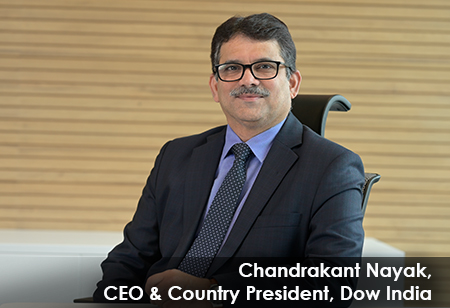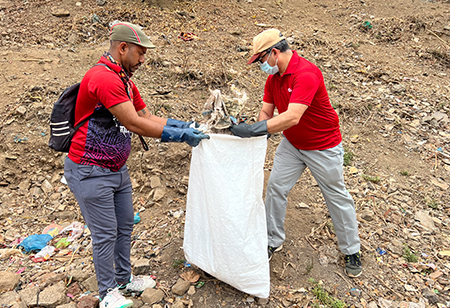
Chemical Industry is Becoming Smarter Reaping the Benefits of Industry 4.0

 With supply chain challenges mitigating after the lockdowns lifted worldwide, the chemical companies are striving to build better, sustainable capacity and expand their horizons. While we start to reap the benefits of Industry 4.0, it creates an excellent milieu for the stakeholders of the chemical industry.
With supply chain challenges mitigating after the lockdowns lifted worldwide, the chemical companies are striving to build better, sustainable capacity and expand their horizons. While we start to reap the benefits of Industry 4.0, it creates an excellent milieu for the stakeholders of the chemical industry.
Chandrakant Nayak, CEO & Country President, Dow Chemical International Pvt. Ltd. (Dow India), deciphers the industry’s challenges and opportunities through an exclusive interview with CEO Insights. With more than three decades of professional experience, Chandrakant has a strong track record of building and leading high-performing teams and defining and implementing an aggressive value growth strategy for various market and product segments. An industry veteran who believes in an inspirational leadership approach, he is also well known for his passion for leadership development and people development.
In conversation with Chandrakant Nayak, CEO & Country President, Dow India
What is the role of digital or industry 4.0 in your company and industry globally? Also, could you elaborate on the trends shaping the industry at large?
Industry 4.0 offers significant outcomes for the chemical industry—faster tracking for consumers, improved products and manufacturing practices, demand forecasting, and real-time assessment. For smaller companies, it enables control and consistency within the design of products. However, after all these years – we have understood that technology is not ‘one-size-fits-all.’ India must develop its own smart-manufacturing plants that can particularly address the economic challenges. It provides an opportunity to create a level playing field for large, medium, and small companies through regulation, innovation in a responsible manner, and creating value that makes India a competitive market for the world.
Coming to the trends shaping our industry today, strong domestic demand keeps the industry’s prices robust. Additionally, the industry is expected to host a massive capital expenditure in the coming years, where companies will try to build better, sustainable capacity and expand markets. For me, I believe the trends are set for this year; customer centricity will lead to product innovations, accelerating the adoption of digitization and investing in a green-circular industry.
I believe companies will try to embody sustainable solutions for the next ten years and coalesce around more ambitious climate goals. It is time to ‘specialize’ as we face increasing cost pressures from geo-political tensions and emerging markets.
Our goal from a technology and innovation standpoint is to always have a seat at the design table amongst our value chain leaders, and we have done an excellent job of achieving that for the past few years. Our best innovations start with our people – who have the ability and zeal to innovate better for a sustainable future.
Could you elaborate on the areas the chemical industry is currently focusing on to enhance its portfolio?
The chemical industry is one of the most significant contributors to the growth and development of any economy. The growth of the Indian chemical industry is expected to double to reach $304 billion by 2025, clocking an annual growth rate of 9.3 percent. This robust growth trajectory is driven by strong growth in domestic consumption, the emergence of strategic global supply chains, the availability of a cost-effective & skilled workforce, and India’s rapidly improving policy and regulatory environment.
I believe companies will try to embody sustainable solutions for the next ten years and coalesce around more ambitious climate goals. It is time to ‘specialize’ as we face increasing cost pressures from geo-political tensions and emerging markets.
To plan the future for the chemical industry – companies must reassess their strategies according to the availability of raw materials, price inflations, and how one would fit in this robust supply chain. Nevertheless, government and regulatory policies will play a large part while we ride unchartered waters with no predictability for what comes next.
What are your views on Sustainability? What is your take on how corporates should become more sustainable?
 Climate change has increased the frequency of severe weather conditions across the world. Our communities and businesses face threats to infrastructure, ecosystems, health, and the economy if global warming continues. We have a responsibility as well as an opportunity to lead in addressing these global challenges.
Climate change has increased the frequency of severe weather conditions across the world. Our communities and businesses face threats to infrastructure, ecosystems, health, and the economy if global warming continues. We have a responsibility as well as an opportunity to lead in addressing these global challenges.
Sustainability is a core business value that is embedded within every associate. In fact, Dow India has always been at the forefront of collaborating with the industry and ecosystem to create best-in-class processes like Responsible Care, Nicer Globe; Rethink+ (a unique plastic waste management takeback program)
Our sustainability targets are three-fold: protect the climate, stop the waste & close the loop by creating a circular economy. Dow India significantly focuses on behavioral change and collaborations to enhance our recycling process each year.
We have been closely working with Advocate Afroz Shah - UN Champion of Earth. An army of volunteers dedicated their time to building awareness in local communities to collect plastic waste. Our passionate team has been participating in various beach clean-up initiatives as well.
One of the concepts that I have personally coined in the last year is – My Sustainability Corner, a plastic waste collection and segregation program engaging school students in the communities of Lote, near Chiplun in Maharashtra. Our NGO partner, Sahyadri Nisarga Mitra (SNM), is fuelled to catch them young and watch them grow, targeting over 4000+ students inculcating plastic waste positive behavior. With an aim to make it a pan-India initiative in the next phase, the model is under implementation in Sriperumbudur, Tamil Nadu, and Taloja, Maharashtra.
With global partnerships and constant innovation, we can tackle these issues head-on and hold ourselves accountable while working together to address climate change and plastic waste.
Tell us about your leadership approach and formula for tackling challenges in your current role.
Whether you are in a leadership position or not, the ability to connect with people and be empathetic defines you and is something I strongly practice. I took charge as the country head during the first wave of the pandemic lockdown; hence on top of the Safety and Security of our operations and people, their communication and engagement became my number one priority.
As a team, we recalibrated employee-connect activities, directed engagement between people and leaders, and updated teams to drive uniform energy and tempo within the organization. Nothing can replace human interaction. An example of that would be during the pandemic; we launched ‘covid support buddies’ who could assist everyone with medical issues, hospital beds, oxygen cylinders, and more. Finding alternatives to keep people engaged was the crux of our plan, and I am glad it came out very well among associates. With an aligned team, I feel incredibly blessed and proud to say that I do not face any major challenges in my current role.
I am quite proud of how the firm embraces the new materials science company. We’re leveraging digitalization not just to connect the company internally but also to provide a degree of customer service that’s unheard of in our business. I believe digitization has the potential to strengthen us and offer us a chance to lead the industry. And that’s incredibly inspiring.
How do you perceive the future of the chemicals industry, and what will be the kind of impacts that you see Dow India creating in the market?
Chemistry is all around us. Around 40 percent of the world’s manufacturing activity is driven by or is heavily dependent on the chemical industry. As India emerges as the manufacturing revolution that creates employment opportunities, the transformation from the traditional approach to a modern-age industrial hub will only be possible with a vibrant and robust chemical sector.
As the population grows exponentially, we require more food, energy, and water to survive. Thus, partnering with allies – across the business, government, and society – to level the global playing field and ensure alignment on credible, effective, and long-lasting solutions will be critical.
Technological innovations and interventions can accelerate the adoption of sustainable practices, especially now when the world has turned to the digitization and virtual platforms. Investing in people and resources is crucial because solutions we need potentially do not exist or are in their infancy. We need to shift to power that is renewable as well as optimize the use of feedstock. All of this will incrementally add to the benefits businesses will see in the long term. We have many energy-efficient materials that decrease the need for insulation and temperature control – you can imagine their applications in cold-chain and affordable housing. And, of course, renewable energy from solar panels, improving access to potable water.
The world we live in is ever-changing, as we have seen over the course of the last few years in particular. You simply cannot try to predict the future. One thing that has come out of the pandemic is that people are ready to invest in a sustainable future where future generations can take over this journey and continue thereon.